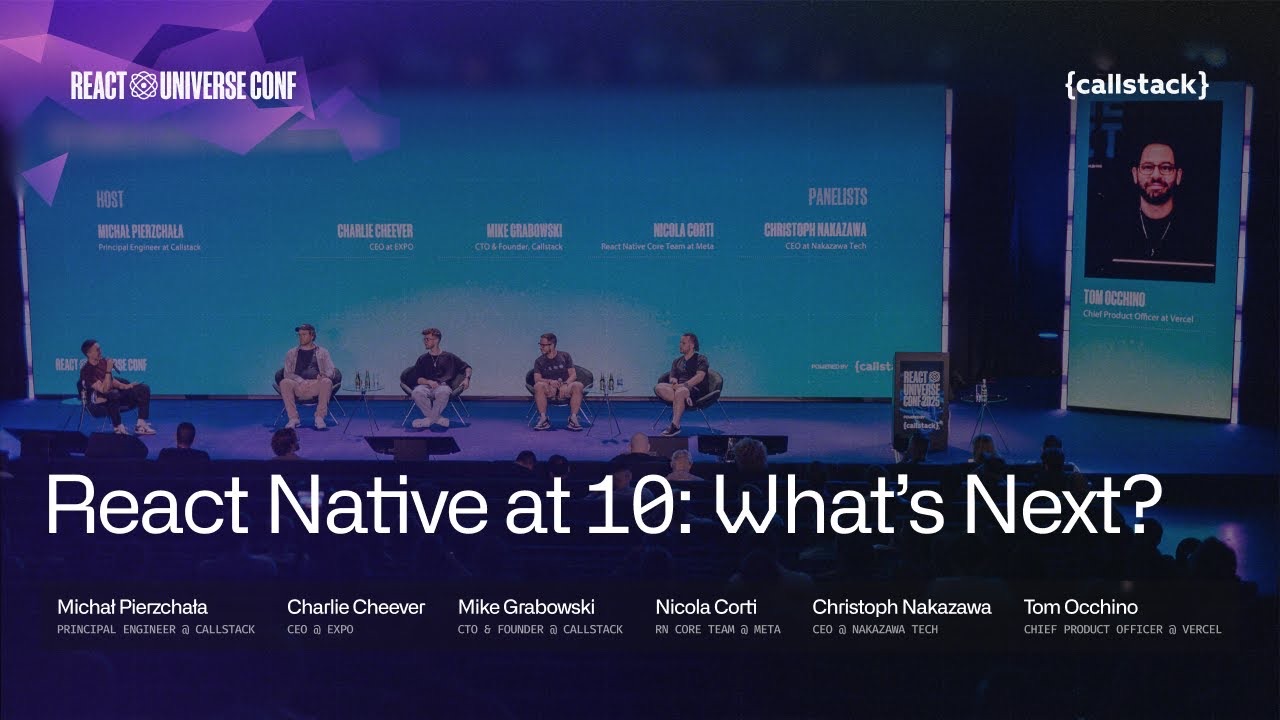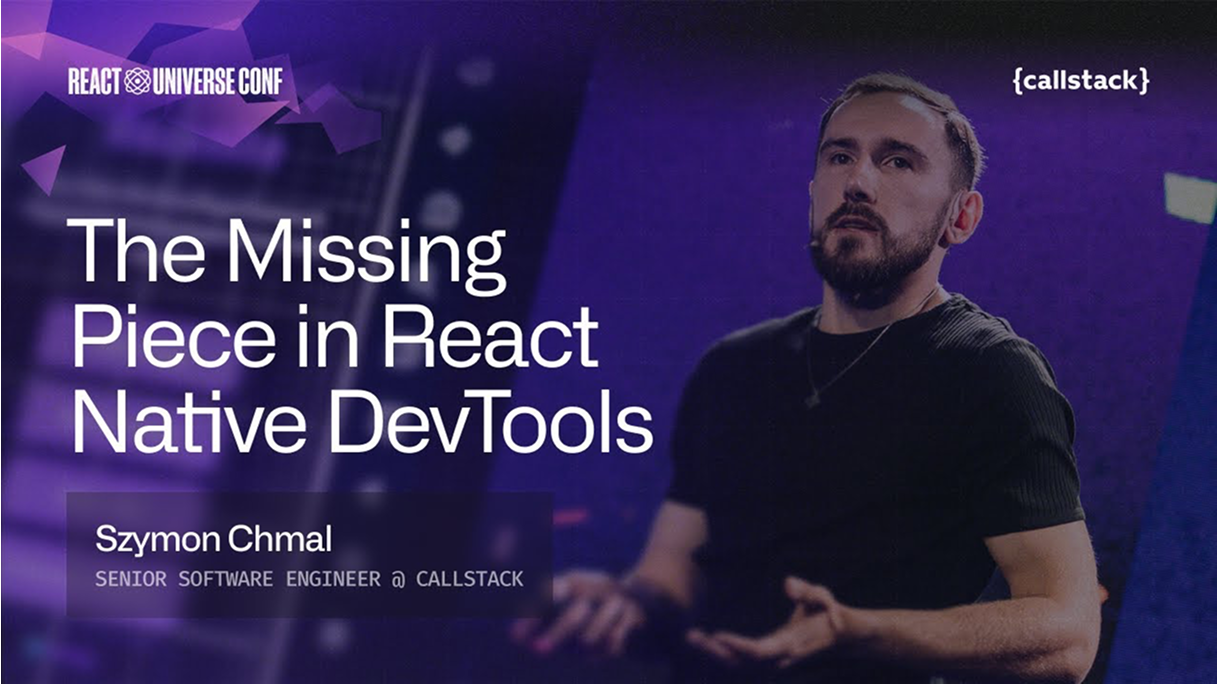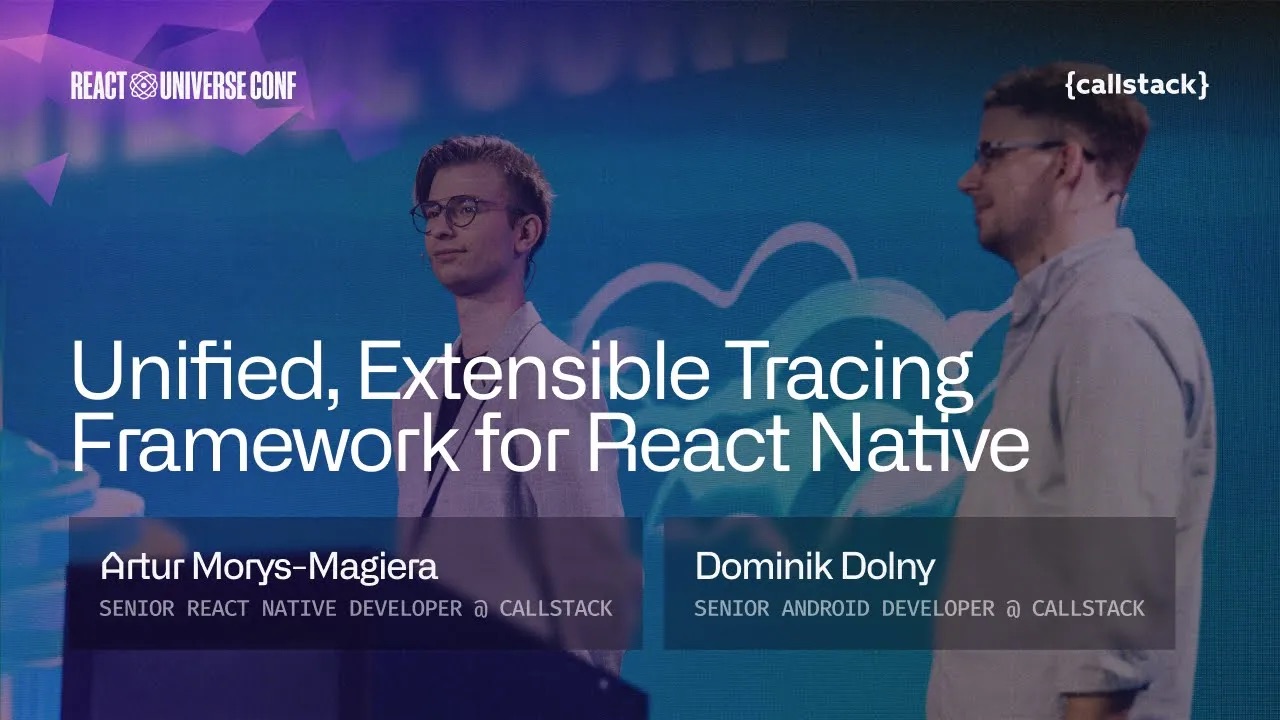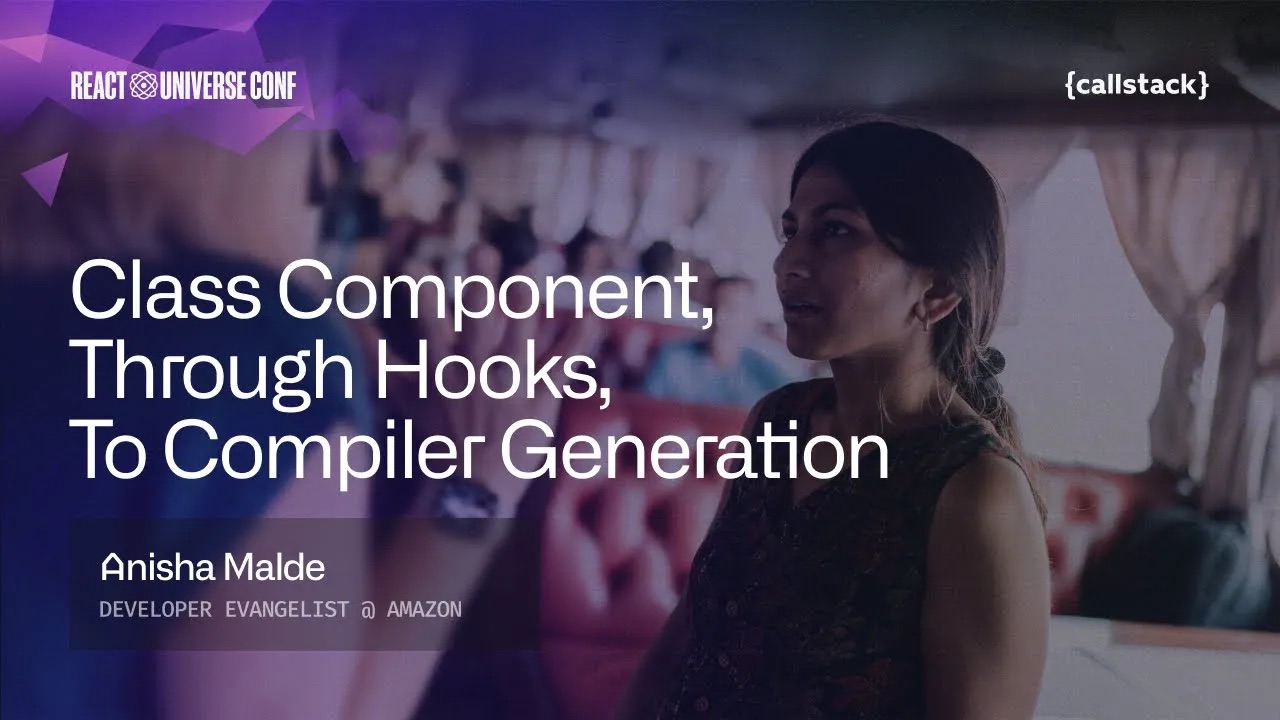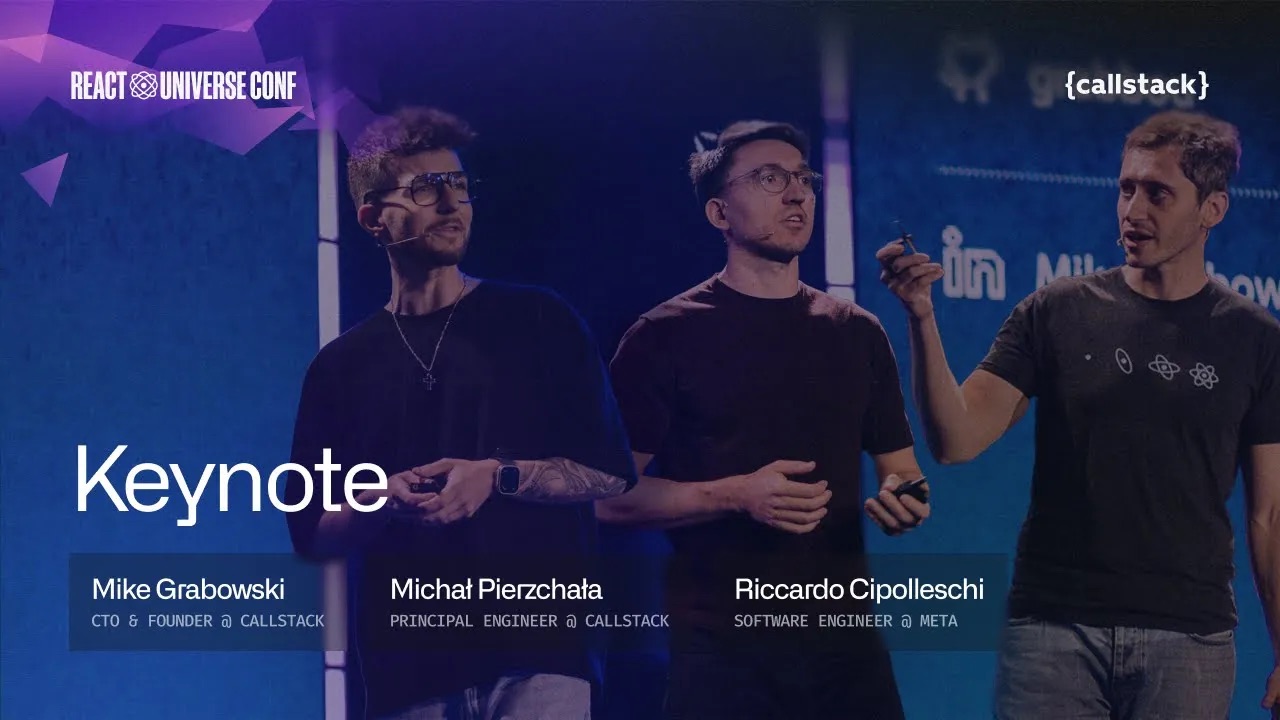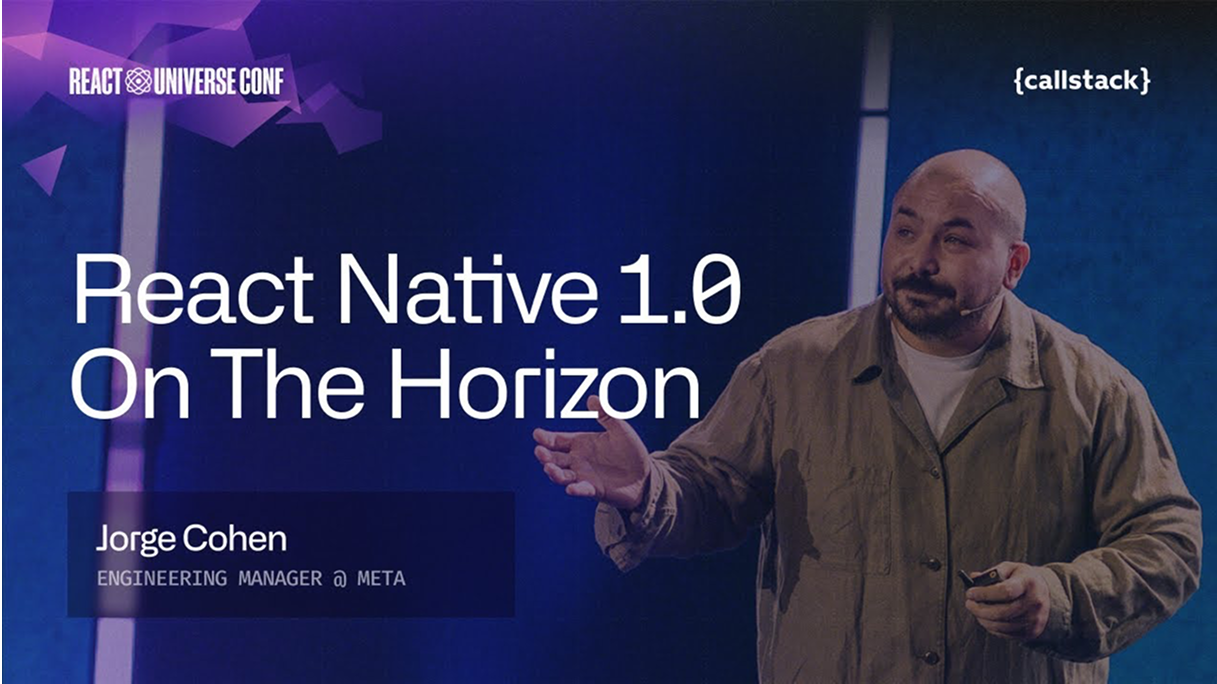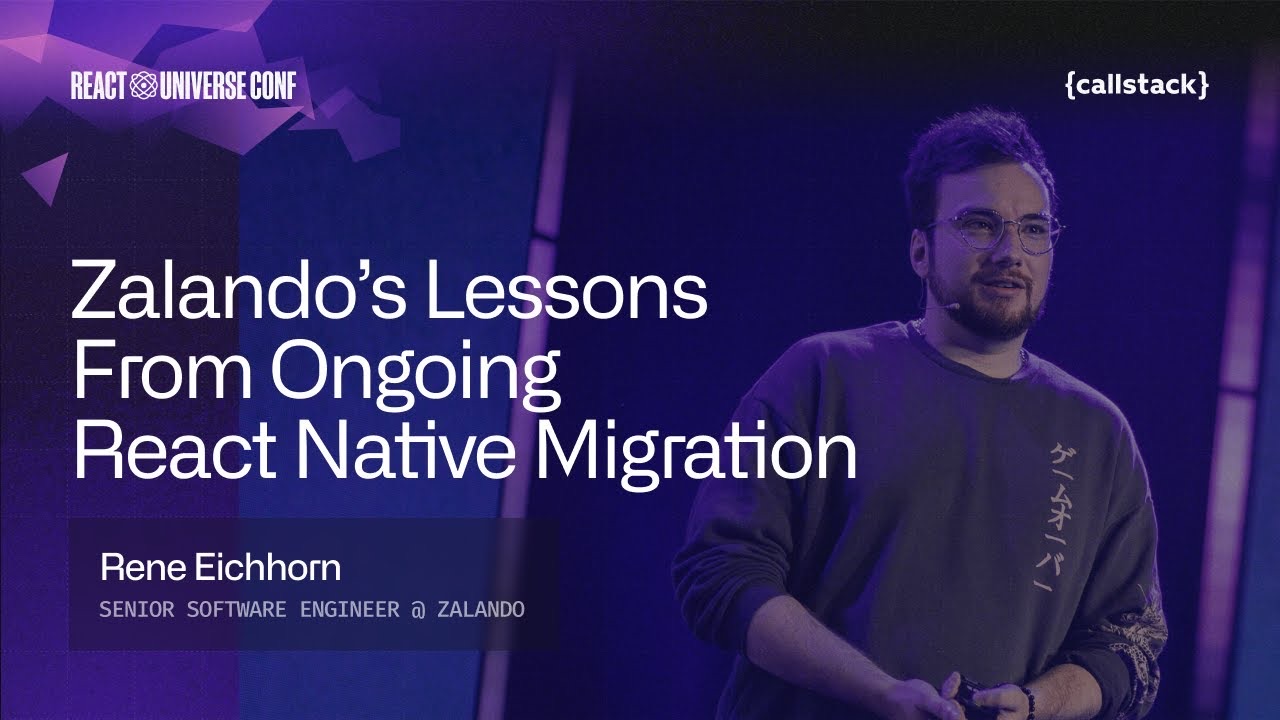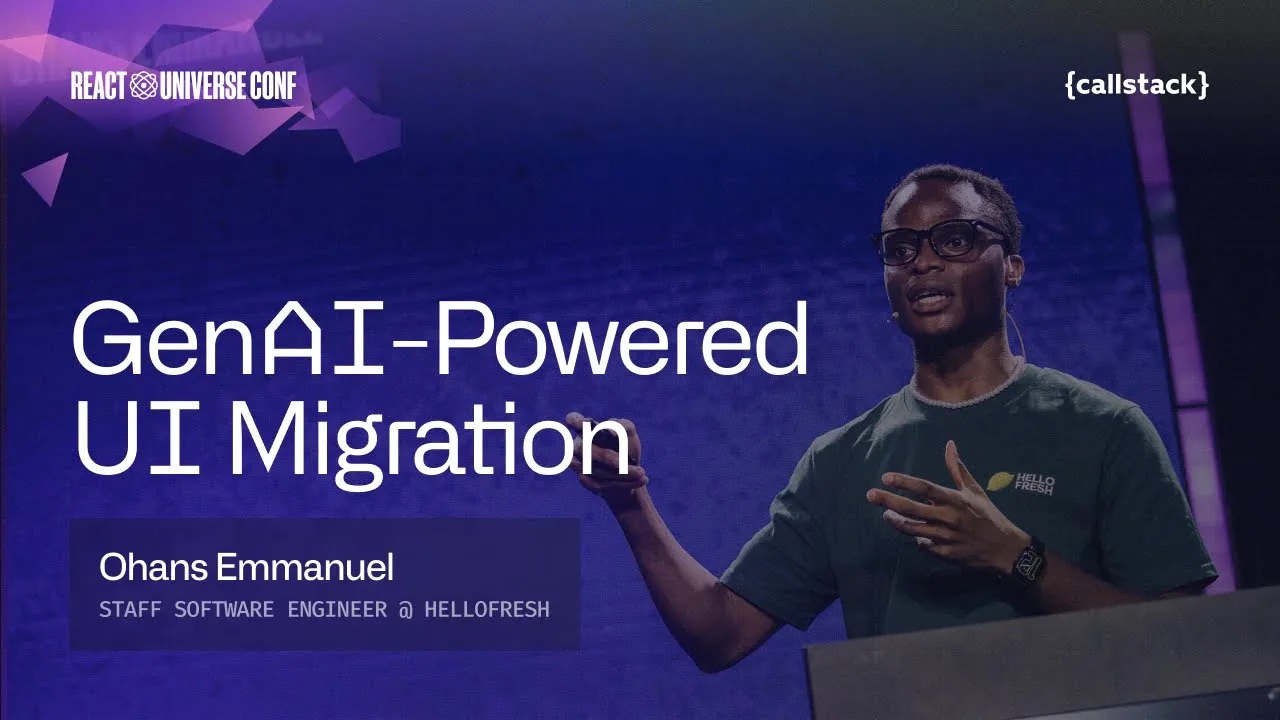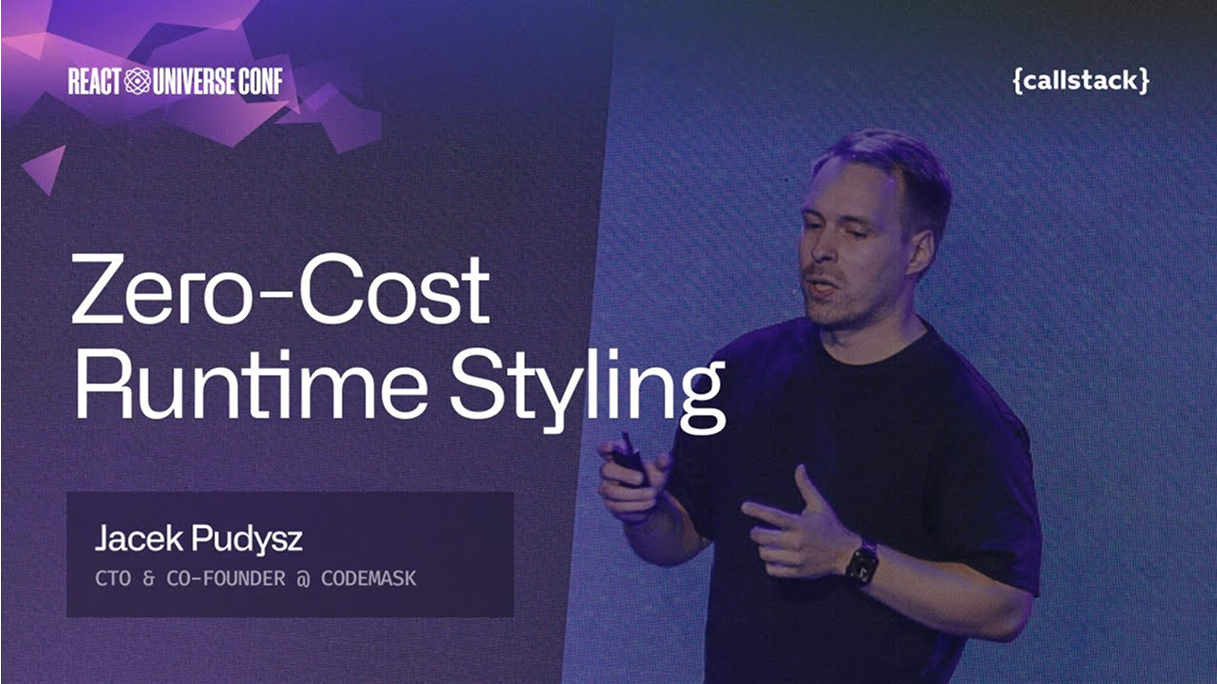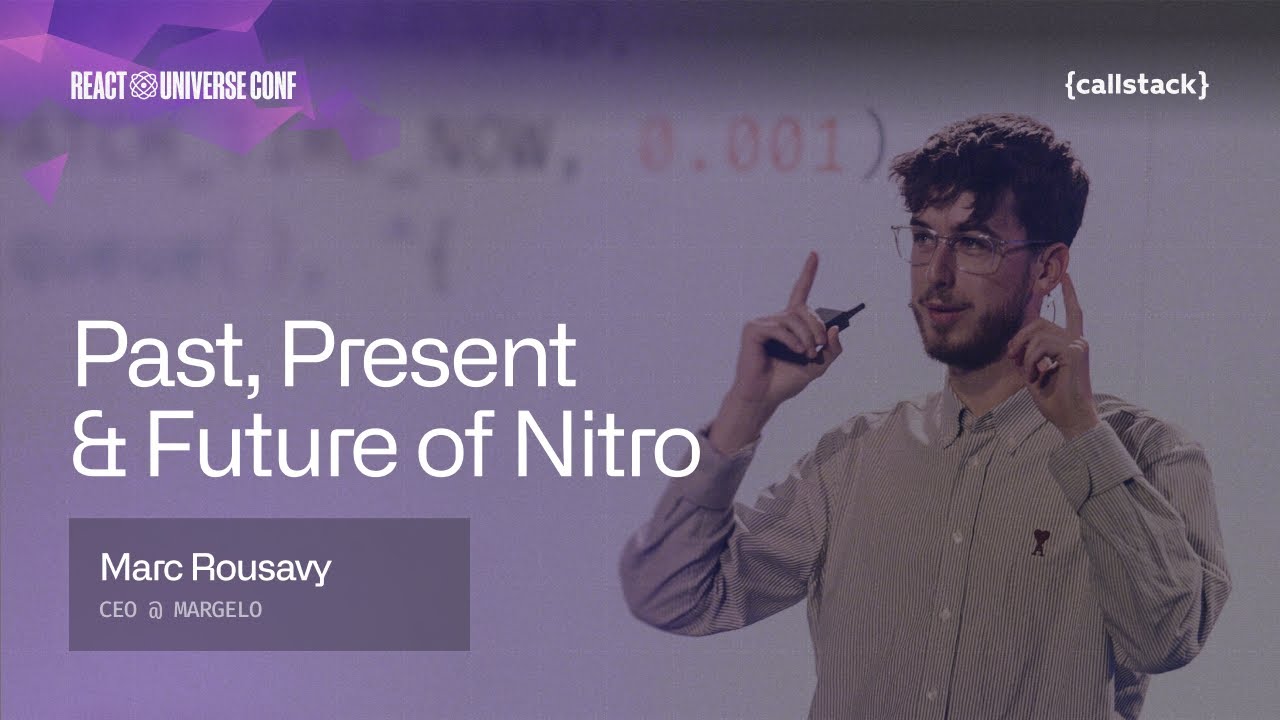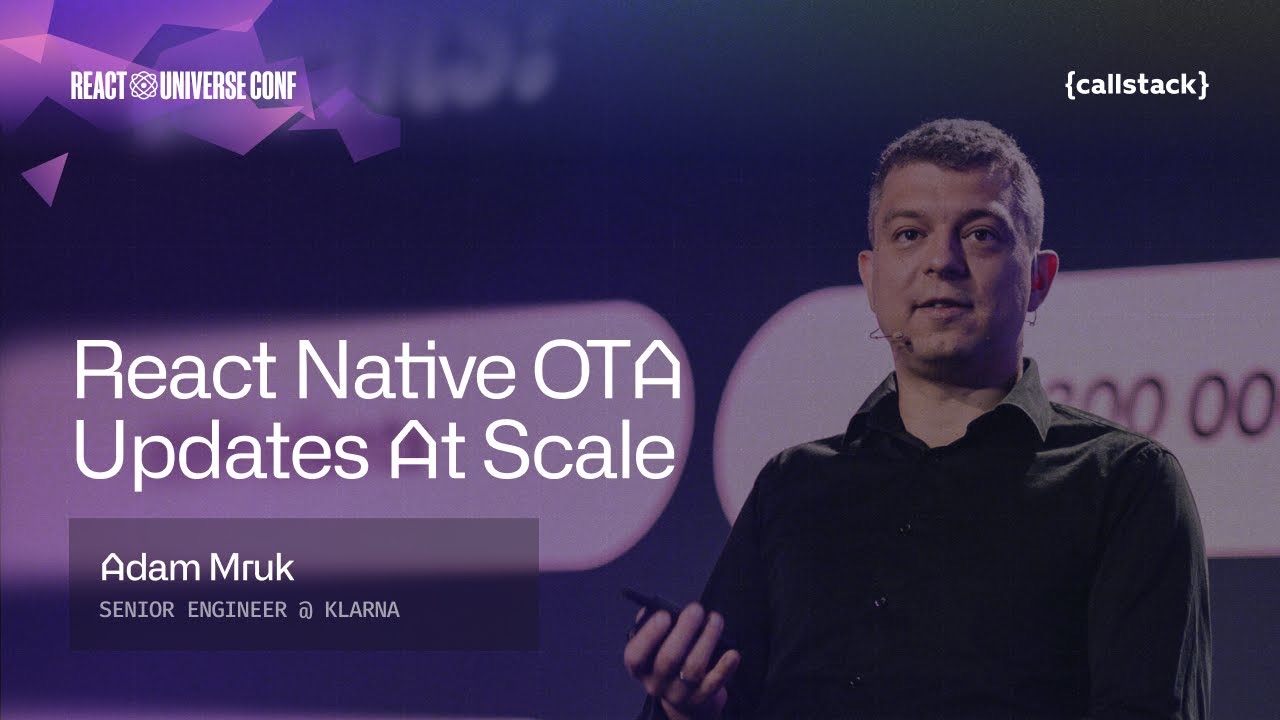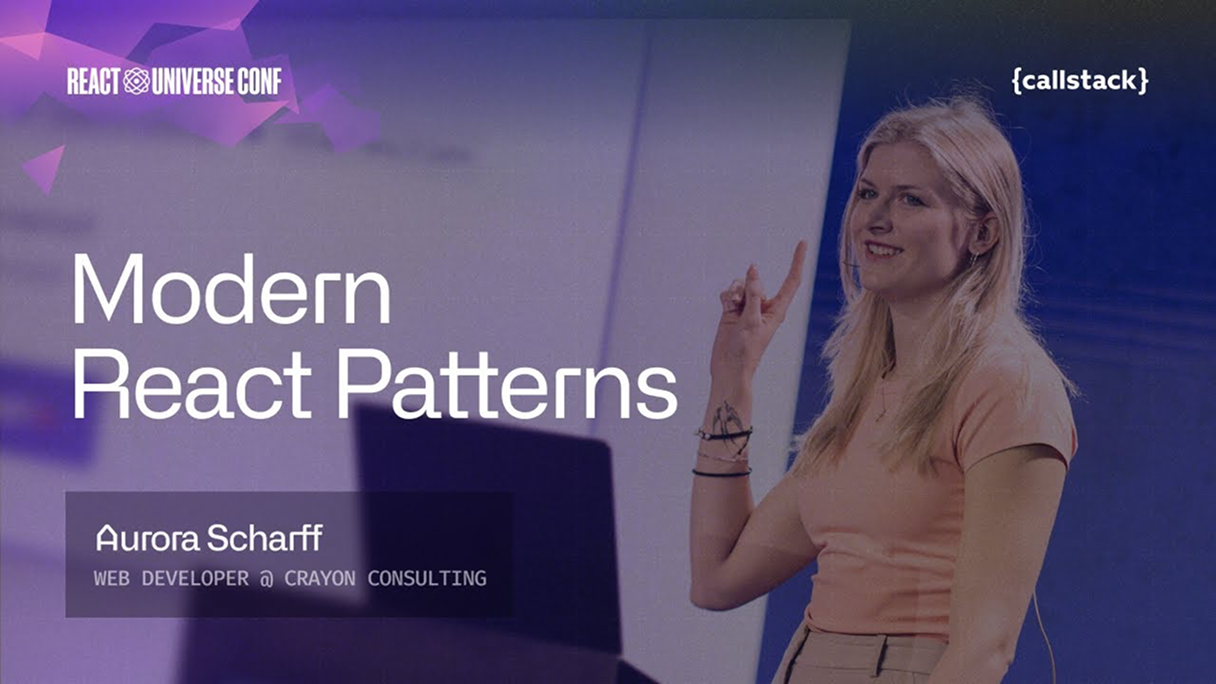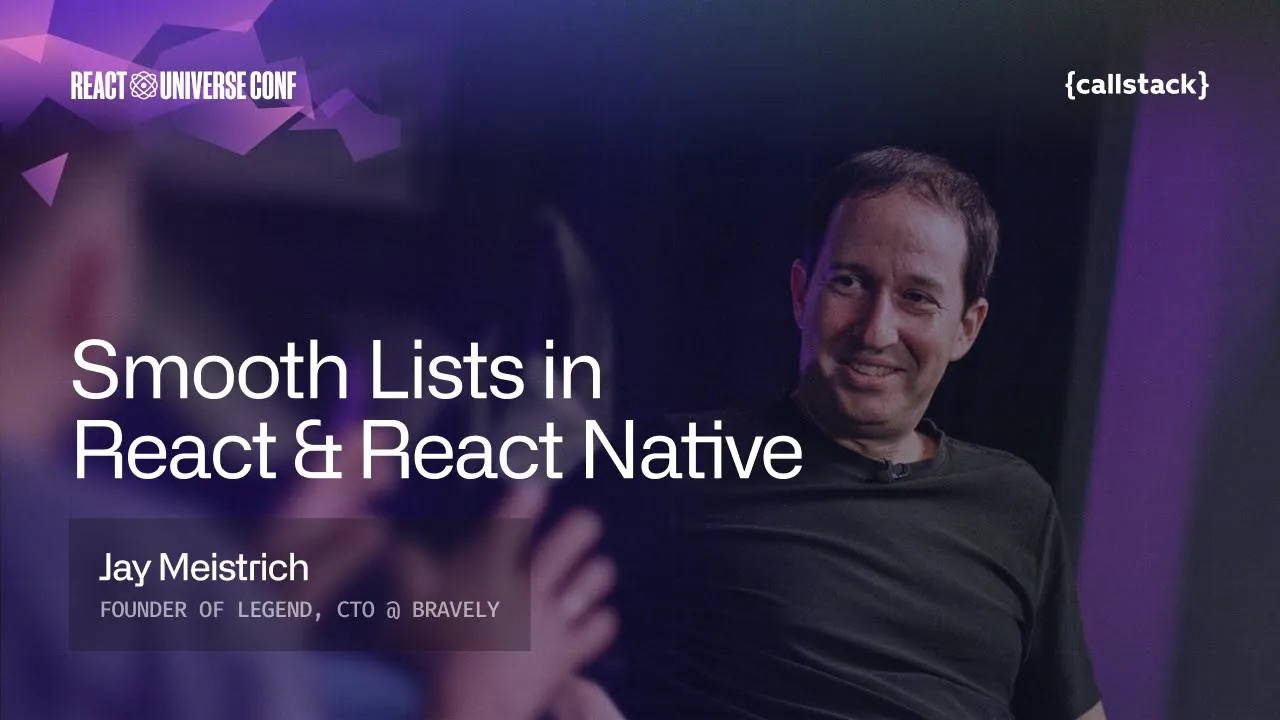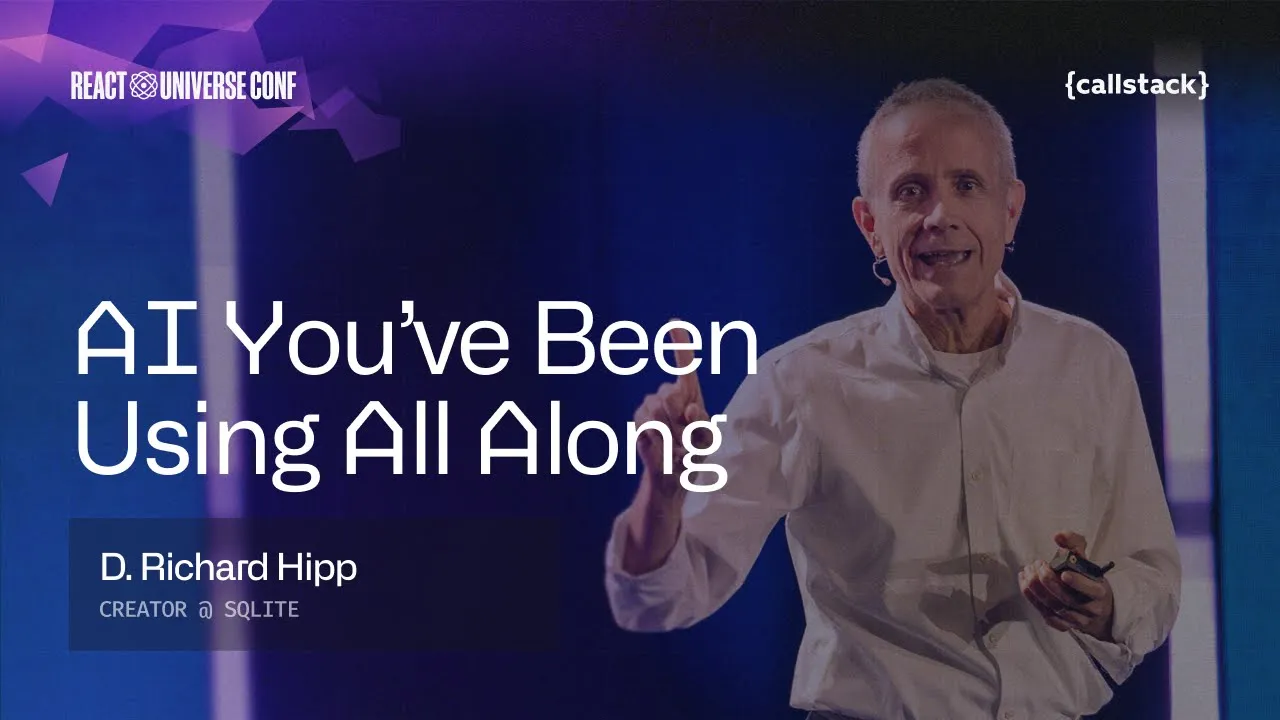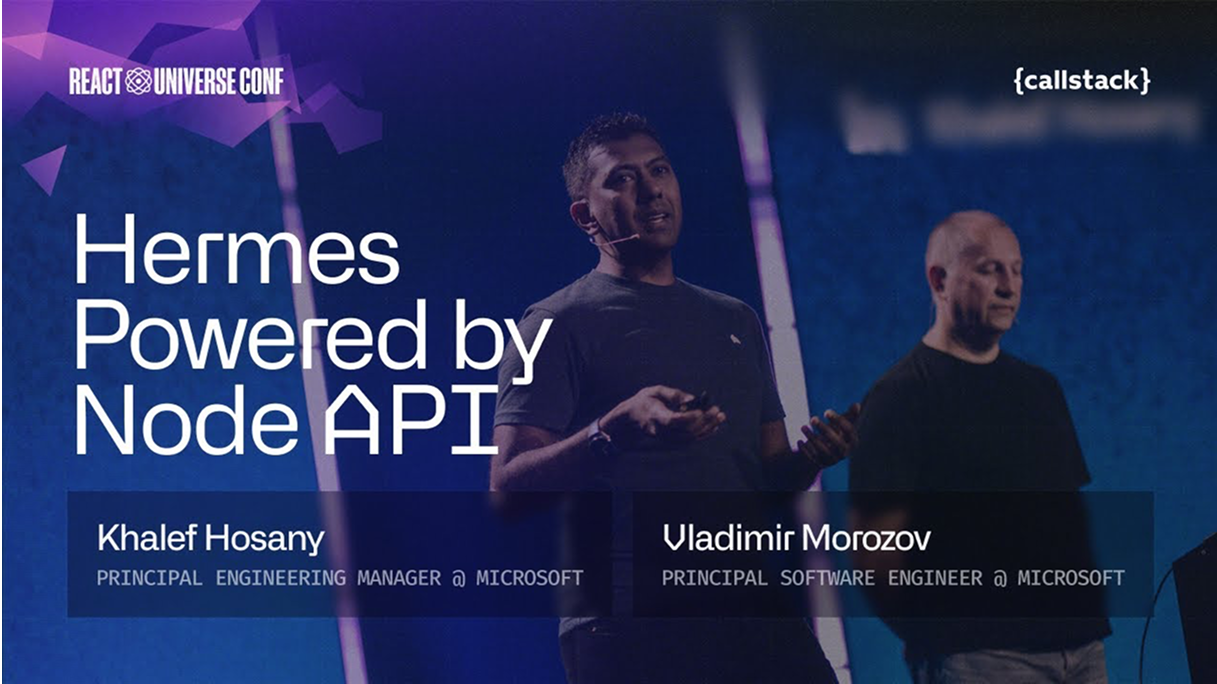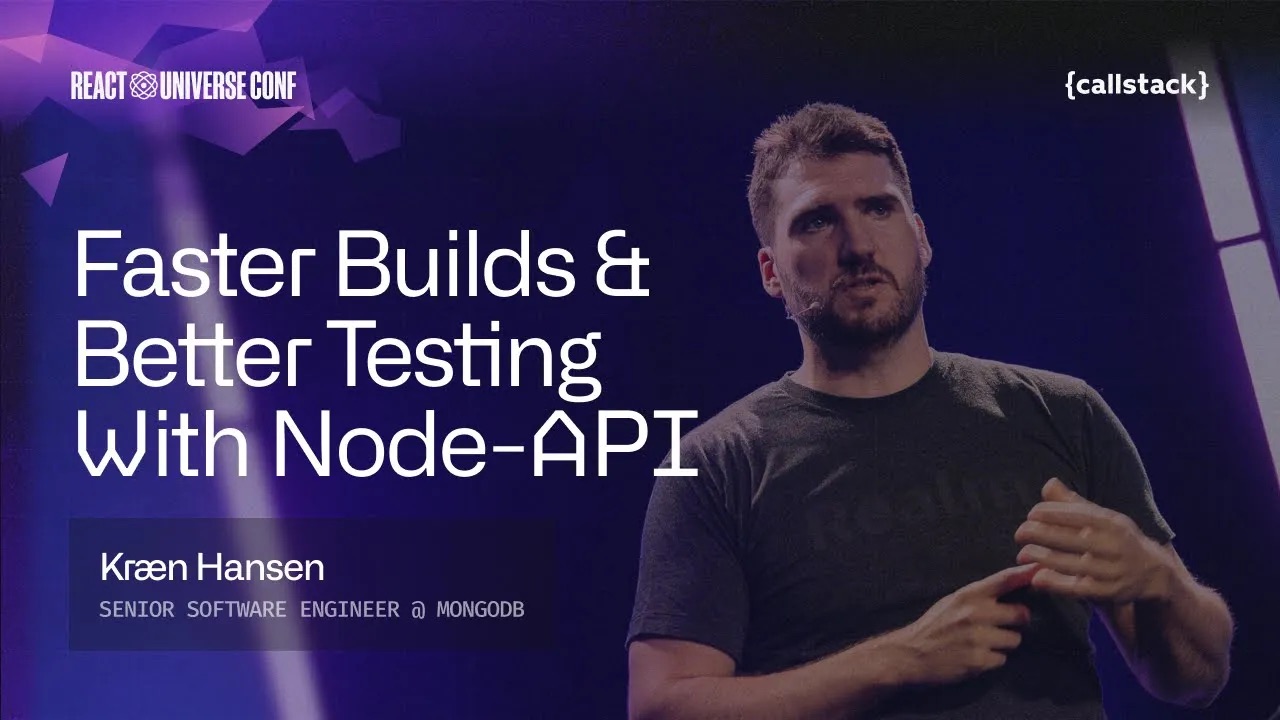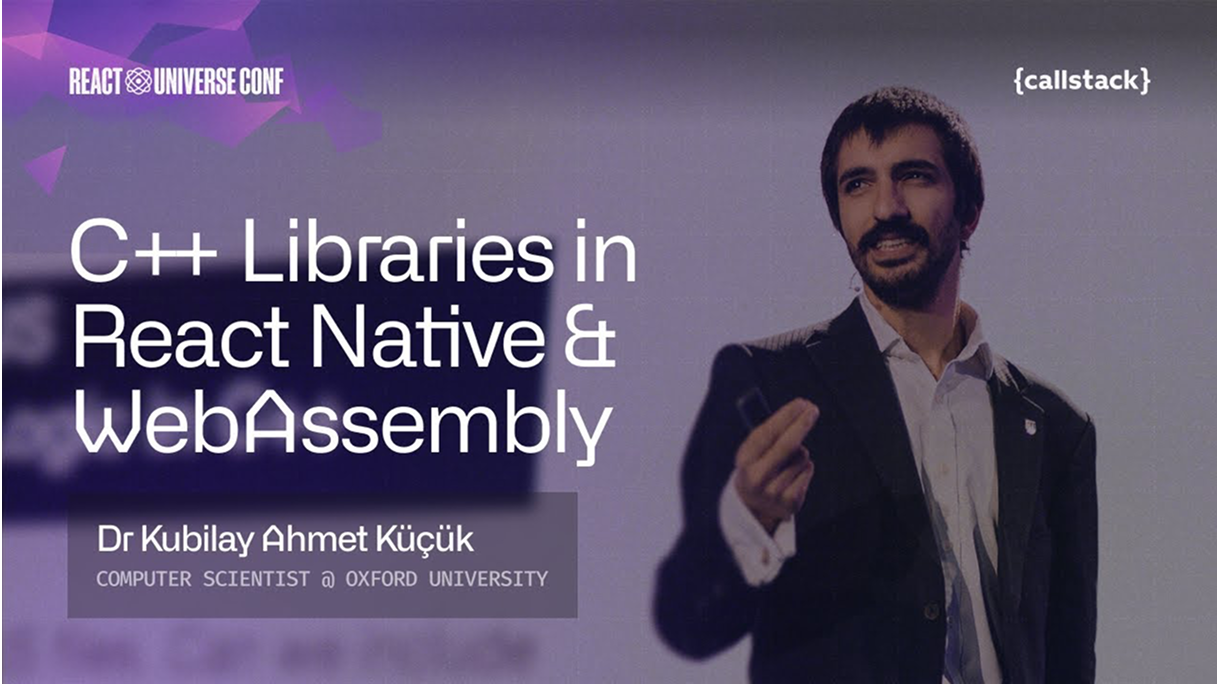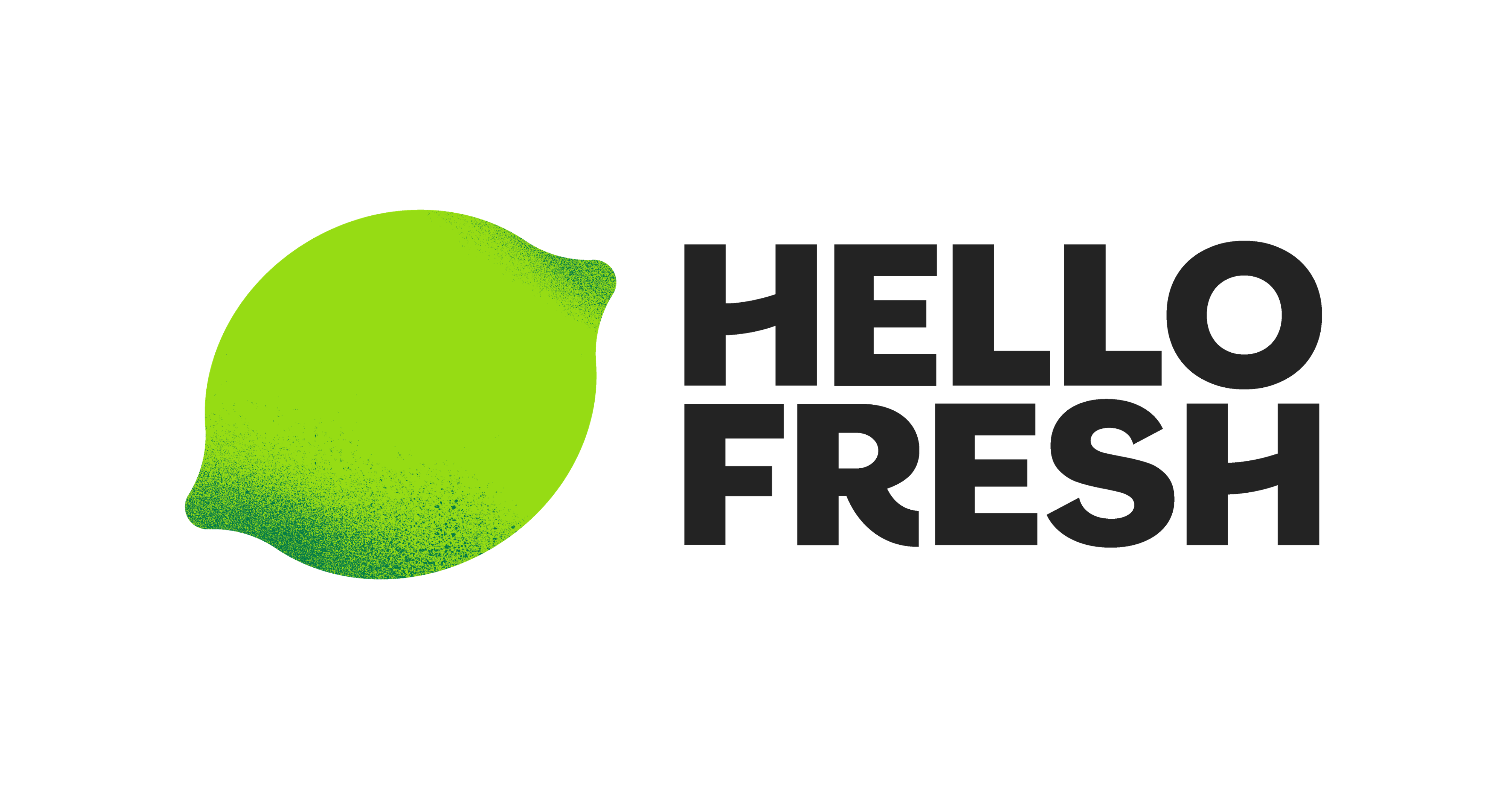Callstack presents
REACT UNIVERSE CONF

September 2-4 / 2025
Wrocław, Poland
BRINGING WORLDS TOGETHER
We bring together the brightest minds in the community to push the boundaries of what's possible with React and React Native.






Join in-depth discussions on full-stack development with React and cross-platform app development with React Native. Explore the tools and best practices not to be heard elsewhere.
LEARN
Meet
Feel















RUC 2025 SPEAKERS


Nicola Corti



Riccardo Cipolleschi



Fernando Rojo



Xuan Huang



Matt Pocock



Tom Occhino



Anisha Malde


.svg)
Charlie Cheever



Chris Trag



Jessie Auguste



Christoph Nakazawa



Mike Grabowski



Jorge Cohen



Marc Rousavy



Rene Eichhorn



D. Richard Hipp



Aurora Scharff



Ohans Emmanuel


.svg)
Jay Meistrich



Khalef Hosany



Kræn Hansen



Violina Popova



Vladimir Morozov



Michał Pierzchała



Adam Mruk



Dr Kubilay Ahmet Küçük



Artur Morys-Magiera



Dominik Dolny



Zackary Chapple



Jacek Pudysz



Szymon Chmal



Tomasz Żelawski



Haoyang Wang



Ziqi Zhen



Mo Gorhom



Danny Williams


.svg)
Kadi Kraman

Danny Williams
Danny is a Senior Fullstack Developer and open source maintainer of react-native-storybook based in Portugal. When he’s not coding or traveling, Danny loves loves to watch sci-fi films and play RPG's.
React’s longtime motto has been: “Learn once, write anywhere”, but what’s involved with launching new apps across multiple device types?
Hear from app builders and library maintainers on the opportunities and challenges when building with React across mobile, web, desktop, AR/VR and smart TVs. We’ll cover common questions such as handling variable screen resolutions, supporting different modes of inputs, scaling issues during high traffic, and what is key for delivering a great app experience across profiles and device form factors.
Whether you’re expanding an existing web app to mobile, launching an out of tree platform, or building for the big screen, this session will provide you with tips and best practices from peers that have been through it before.
Mo Gorhom
Mo is a software engineer at Amazon with over 10+ years of mobile development from Adobe Air, and native development. Alongside his daily work in React Native development, Mo is the open source maintainer for react-native-bottom-sheet and react-native-portal
React’s longtime motto has been: “Learn once, write anywhere”, but what’s involved with launching new apps across multiple device types?
Hear from app builders and library maintainers on the opportunities and challenges when building with React across mobile, web, desktop, AR/VR and smart TVs. We’ll cover common questions such as handling variable screen resolutions, supporting different modes of inputs, scaling issues during high traffic, and what is key for delivering a great app experience across profiles and device form factors.
Whether you’re expanding an existing web app to mobile, launching an out of tree platform, or building for the big screen, this session will provide you with tips and best practices from peers that have been through it before.
Kadi Kraman
Kadi is an Engineering Manager on the Developer Success team at Expo. Her main focus is to guide users towards building their best apps via great developer experience, tooling, and learning resources. Prior to Expo, she worked at several software consultancies, solving many exciting challenges building React and React Native apps.
React’s longtime motto has been: “Learn once, write anywhere”, but what’s involved with launching new apps across multiple device types?
Hear from app builders and library maintainers on the opportunities and challenges when building with React across mobile, web, desktop, AR/VR and smart TVs. We’ll cover common questions such as handling variable screen resolutions, supporting different modes of inputs, scaling issues during high traffic, and what is key for delivering a great app experience across profiles and device form factors.
Whether you’re expanding an existing web app to mobile, launching an out of tree platform, or building for the big screen, this session will provide you with tips and best practices from peers that have been through it before.
Jessie Auguste
Jessie Auguste is a Software Engineer at CybSafe, where she contributes to building solutions in the UK's vibrant tech startup ecosystem. With a passion that extends far beyond code, Jessie has established herself as a powerful voice for equality, diversity, and inclusion in technology.As co-host of "Glowing in Tech," the weekly podcast that illuminates stories and depth behind tech developments, Jessie brings authentic conversations with industry innovators directly to global audiences. Jessie has delivered technical presentations for LeadDev, codebar, and Docker. She's travelled to speak and host at conferences such as DevConf, Pycon US, React Miami, and BeJS, where she seamlessly blends technical depth with inspiring advocacy for inclusive innovation.
Maciej Jastrzębski
Hear the real-world migration stories - from making the decision to move, to overcoming challenges, to celebrating the wins.
Discussion points include:
- Why migrate? The tipping point for each company
- Gradual migrations, confidence-building, and different strategies (greenfield, hybrid, incremental)
- Challenges around tech debt, platform differences, performance, and accessibility
- Team models, collaboration, and building internal trust in React Native
- Measuring success, case studies, and lessons learned
Haoyang Wang
Haoyang is a software engineer on the Lynx team at ByteDance. He's focusing on the Web development tech stack, including TypeScript, WASM, Rust, Node.js, HTML, and CSS. He is also experienced with compiler frontends, DSLs, and VSCode language services. He lives with a cat.
For over a decade, we've lived in a universe where programming UIs with React on the client-side, from event handling to rendering, has been ruled by a single JavaScript thread. But what if React had been born differently? What if, from day one, it had been designed to fully embrace two threads? What benefits would that unlock? What challenges would we face? And what new features, abstractions, and patterns might emerge?What if this isn't just imagination... but something that exists today?
Ziqi Zhen
Ziqi is a software developer on the ReactLynx framework team at ByteDance. He enjoys bridging the gap between high-level application logic and low-level system performance, working across the stack with TypeScript, Rust, and C++. Outside of work, he recharges by cycling and reading.
For over a decade, we've lived in a universe where programming UIs with React on the client-side, from event handling to rendering, has been ruled by a single JavaScript thread. But what if React had been born differently? What if, from day one, it had been designed to fully embrace two threads? What benefits would that unlock? What challenges would we face? And what new features, abstractions, and patterns might emerge?What if this isn't just imagination... but something that exists today?
Tomasz Żelawski
I'm Tomasz Żelawski, a software engineer working at Software Mansion, working in the React Native Open Source team for over two years. I utilize my deep love for low-level programming and academic aspects of code to manipulate abstract syntax trees, chase race conditions and basically hack whatever I can.
Big changes are coming into how things are done in React Native with the library react-native-worklets. It's time to showcase the advantages of concurrent JavaScript and dive deep into its internals and implementation quirks.
Chris Trag
Chris is the Head of Evangelism at Amazon Appstore where he works on engaging mobile app & game developers around the world. He previously built developer relations programs at Stripe, Evernote, and Roku, and served as the web developer for Harvard.edu.
React’s longtime motto has been: “Learn once, write anywhere”, but what’s involved with launching new apps across multiple device types?
Hear from app builders and library maintainers on the opportunities and challenges when building with React across mobile, web, desktop, AR/VR and smart TVs. We’ll cover common questions such as handling variable screen resolutions, supporting different modes of inputs, scaling issues during high traffic, and what is key for delivering a great app experience across profiles and device form factors.
Whether you’re expanding an existing web app to mobile, launching an out of tree platform, or building for the big screen, this session will provide you with tips and best practices from peers that have been through it before.
Christoph Nakazawa
Christoph is the CEO of Nakazawa Tech, an indie game studio and open source company based in Tokyo.
Originally from Austria, Christoph has been creating video games and social networks since 2002, spent the 2010s at Facebook in Menlo Park and London managing JavaScript Infrastructure and the React Native team and he built Jest, Metro, Yarn, and MooTools. Now, he is focusing on video games, open source, and building the future. Reach out if you'd like to work with him!
Modern JavaScript development is often synonymous with decision paralysis. Let's stop wasting time picking libraries and build apps end-to-end fast using an open source stack with great defaults.
Tom Occhino
Tom is the Chief Product Officer at Vercel leading Engineering, Product, and Design. Previously he spent over 12 years at Facebook where he led development of the company’s core JavaScript Infra, shaped its open source program, and was responsible for the creation and development of React and React Native. He enjoys traveling, dance music, fancy cocktails, and simple food
React Native has become an established cross-platform technology. Ten years is enough time to go through major rewrites, experience exciting milestones, and endure a few moments we’d rather forget. But what got us here won’t get us there.In this panel, we’ll reflect on the past decade of React Native and look ahead to the next ten years. With AI rapidly transforming the software and app development landscape, we’ll explore how React Native—along with the developers and intelligent agents using it—can be positioned for long-term success.
Rafael Mendiola
Rafael Mendiola is a Boston-based Staff React Native Engineer at Hinge Health. He works in the intersection of design and software development, with a passion for operational excellence. He's currently focused on how AI is going to change products and developer workflows.
Developers spend significant time on non-coding tasks: presentations, documentation, proposals, note-taking. Most of us use off-the-rack tools like PowerPoint, Google Slides, Notion, or Confluence. These are well-made, but like off-the-rack clothing, they're designed to fit everyone reasonably well, which means they don't fit anyone perfectly. AI has changed the economics of custom tooling. Building your own tools now takes hours instead of weeks. As developers, we can now tailor our own tools, crafted to fit our exact workflow and style.
This talk walks through building two custom tools. First, a presentation engine that generates complete slide decks quickly, tailored to your speaking style. Need slides that feel technical and approachable? You can make them in minutes, not hours. Second, a developer notebook built with Astro that serves as a collaborative space with your AI agent, which should allow you to organize and sketch out technical ideas more quickly.
What You'll Learn
- Build a presentation quickly with Vite + React: generate complete slide decks quickly, styled exactly how you want them
- Create a developer notebook with Astro: a notebook designed for AI collaboration, where you can work with Claude or Cursor to flesh out ideas while maintaining full control over the look and structure
- Work with AI to research your codebase and write technical notes: turn your code exploration sessions into permanent, searchable documentation.
Eric Fahsl
Eric is a Principal Product Manager in the Amazon Devices Organization, where he works on new initiatives for Amazon app partners in the TV space. He previously was a consultant for Accenture working on Web Architectures. When not in front of a computer screen, you can find him trail running in the mountains.
Your React app works great on phones (and desktops) however TVs are a different world. Remote controls, D-pad navigation, and the 10-foot UI change everything. In this lightning talk, see how Amazon’s new AI coding assistant (Kiro.dev) helps you adapt mobile components for the living room fast.
We’ll use Kiro’s spec-driven AI development process to walk through a mobile-to-TV React app remodel by building TV-safe layouts, handle spatial navigation and focus management, all while keeping an eye on performance (your TV is likely a lot slower than your phone or desktop). You’ll walk away with TV-specific design tips and a fresh look at how AI can speed up your cross-platform dev workflow.
Szymon Rybczak
Szymon Rybczak, 19-year-old React Native Developer at Callstack, passionate about open-source technologies, AI integration in mobile apps, and building universal cross-platform solutions. Creator of react-native-ai and active contributor to the React Native ecosystem.
The AI SDK provides an elegant abstraction layer that simplifies building sophisticated AI applications across cloud and on-device environments. AI SDK allows providing custom providers - and in this talk, we will demonstrate how we built a custom provider and brought on-device local offline LLMs to mobile apps.
Join us as we explore the creation of react-native-ai, a custom AI SDK provider that enables local LLM execution directly in React Native apps. We'll dive deep into the provider architecture of AI SDK and show how we leveraged it to integrate with MLC LLM Engine and Apple's foundation models to mobile devices.
What you'll discover:
- AI SDK: why we decided to rely on it when building react-native-ai?
- AI SDK Provider Architecture: Understanding the core abstraction and how providers work
- Building Custom Providers: Step-by-step implementation of on-device LLM providers
- Seamless Integration: How react-native-ai plugs into generateText() and streamText()
- Apple Intelligence Provider: Creating @react-native-ai/apple as an AI SDK-compatible provider
- Provider Flexibility: Switching between cloud and on-device models with identical APIs
- Live demo: we will showcase how the same AI SDK code works seamlessly across OpenAI's cloud models and local on-device LLMs, highlighting the power of AI SDK. Learn how to extend AI SDK's capabilities to new platforms and unlock privacy-first, offline-capable AI applications.
Charlie Cheever
React Native has become an established cross-platform technology. Ten years is enough time to go through major rewrites, experience exciting milestones, and endure a few moments we’d rather forget. But what got us here won’t get us there.In this panel, we’ll reflect on the past decade of React Native and look ahead to the next ten years. With AI rapidly transforming the software and app development landscape, we’ll explore how React Native—along with the developers and intelligent agents using it—can be positioned for long-term success.
React Native has become an established cross-platform technology. Ten years is enough time to go through major rewrites, experience exciting milestones, and endure a few moments we’d rather forget. But what got us here won’t get us there. In this panel, we’ll reflect on the past decade of React Native and look ahead to the next ten years. With AI rapidly transforming the software and app development landscape, we’ll explore how React Native - along with the developers and intelligent agents using it - can be positioned for long-term success.
Szymon Chmal
Szymon is a passionate software developer and a Microsoft MVP in web development. He is the creator of Rozenite, a plugin framework for React Native DevTools, and a member of the Callstack Incubator, where he focuses on building next-generation tooling to improve the React Native testing workflow. With extensive experience in React, React Native, Next.js, and Node.js, Szymon is dedicated to exploring cutting-edge technologies and advancing the developer experience.
Remember the days of Flipper, and how it was designed to be extensible? While the new React Native DevTools are a huge step forward, they still lack a crucial element: a robust plugin system. That's why I created Rozenite. I went down the rabbit hole, reverse-engineering the core DevTools architecture not to fork it, but to build a clean, powerful plugin framework right on top of it.In this talk, I'll walk you through the journey of how I built Rozenite. You'll discover how the DevTools communicate, how to hook into the system cleanly, and how my framework enables developers to build their own plugins with powerful, sandboxed execution and native React-based UIs. No matter if you are building a devtool for yourself or the community — Rozenite is there to help you.
Artur Morys-Magiera
The following course is designed for developers who have production experience with React Native.
The scope dives deep into the native side of the framework. It’s a very low level in terms of React Native development. The course tackles a lot of iOS and Android application development topics. It’s perfect for gaining a comprehensive overview of mobile app creation and lets you look at React Native differently.
Matt Pocock
Matt Pocock is a world-renowned developer, educator, and author of Total TypeScript and AI Hero. He lives in Oxford, and thinks that Polish devs are probably the best in the world.
The course is designed for developers who have production experience with TypeScript and React and want to learn more about AI.The scope dives deep into the practical side of AI development with the Vercel AI SDK v5. It's a very hands-on workshop focused on building real AI applications that users actually want to use. The course tackles the modern AI development stack - from building agents, streaming responses and production monitoring. Whether you're looking to deepen your AI expertise or simply want to understand the tools you're already using in Cursor, Windsurf, and VSCode, this workshop will transform how you think about AI-powered development.
Anisha Malde
Anisha is a React Native Developer Advocate at Amazon where she is focused on engaging and enabling app developers. When she's not writing guidebooks on developing for TV, you can find her refactoring recipes and savoring bytes across the world
This talk explores the generational divide in React development, examining how different learning journeys have shaped developers approaches to the framework. We'll trace React's evolution from the "Class Component Generation" to the "Hooks Generation," to the emerging "Compiler Generation" understanding how these distinct starting points influence coding styles, preferences, and best practices.
Mike Grabowski
CTO and Founder at Callstack. Developer Experience is my passion. In the past, I worked on “react-native link”, “auto-linking” and the CLI. When not coding, I am probably on a race track!
React Native has become an established cross-platform technology. Ten years is enough time to go through major rewrites, experience exciting milestones, and endure a few moments we’d rather forget. But what got us here won’t get us there.In this panel, we’ll reflect on the past decade of React Native and look ahead to the next ten years. With AI rapidly transforming the software and app development landscape, we’ll explore how React Native—along with the developers and intelligent agents using it—can be positioned for long-term success.
Jorge Cohen
Jorge is an Engineering Manager on the React team at Meta, where he supports the developer experience and open source efforts, working on projects like React Native's stability, Metro, React DevTools, and the React Native DevTools. He has a background in cross-platform mobile development and has previously led engineering teams at Citymapper and Meta Reality Labs, working on emergent platforms and products that explore new interaction paradigms. With over 20 years of experience, Jorge is passionate about building software that empowers developers. In his free time, he enjoys cycling, tinkering with emulators, and exploring the intersection of technology and design history.
We’ve been shipping React Native faster than ever, and not without a good reason. It’s about making things more predictable and stable for you. So, join us on this journey as we move towards a more stable future. Next stop: one-poin…?!This talk will present React’s strategic overhaul of the React Native release process. We will reveal internal initiatives and processes designed to address community feedback, dramatically reduce breaking changes, decrease release effort, and deliver truly predictable release schedules, on a path towards stability. You’ll finally understand why we make the decisions we make, learn the inner workings of our release process and the rationale behind these changes. You'll discover how this directly translates into a more stable, efficient, and developer-friendly experience for the entire React Native community, ultimately making upgrades simpler, your apps stabler and the ecosystem healthier!
Rene Eichhorn
Rene is a Senior Software Engineer at Zalando SE who’s primarily contributing to Zalando’s in-house framework, bringing it to apps with React Native and envisioning a cross platform architecture. Outside working hours he loves tinkering small toy projects with Rust and is happy to philosophise about programming language design.
This talk dives deep into technical details of our ongoing React Native adoption for the Zalando App. It will cover our non-standard brownfield integration strategy and the challenges we faced achieving seamless interoperability with existing native app code. We'll detail our architectural choices, including the use of React Strict DOM as a core foundation for future web and mobile unification. Plus, we'll share insights into the design and tradeoffs of reusing Zalando's existing internal React framework to extend React Native's capabilities and establish the same overarching patterns across platforms, bridging the gap between our web and app products.
Riccardo Cipolleschi
Riccardo is a Software Engineer with 7 years of experience in iOS development. He joined Meta and the React org in March 2022. Since then he mainly worked on the Open Source build system for iOS and on the rollout of the New Architecture in the Open Source. In his free time, he writes technical articles on Swift, runs, plays tennis and drums.
Nicola Corti
Nicola Corti is a Google Developer Expert for Kotlin. He has been working with the language since before version 1.0, and he is the maintainer of several open-source libraries and tools for mobile developers. He's currently working in the React Native Core team at Meta, building one of the most popular cross-platform mobile framework.Furthermore, he is an active member of the developer community.His involvement goes from speaking at international conferences to being a member of CFP committees and supporting developer communities across Europe.In his free time, he also loves baking, podcasting, and running.
Ohans Emmanuel
I'm a frontend engineer, a technical author with 5+ books published and an avid reader. Since 2017, I've blogged extensively, with my blogs garnering well over 4 million views. I don't promise to know everything, and love fiddling with new technologies.
We moved to React Native at HelloFresh and used GenAI to speed up the effort. Here's a real-world journey of leveraging coding agents to analyse and automate the conversion of web components to native mobile UI, streamlining cross-platform consistency and cutting weeks of manual refactor work down to hours.
Jacek Pudysz
I'm a passionate programmer who decided to go beyond JavaScript and dive into React Native internals and native languages. I love coding for everything from mobile to backend, and I enjoy sharing my knowledge with the community. Building multiple things at once? That's me! I'm actively exploring new technologies to master my skills.
The hunt for zero-cost runtime styling forced us to leave JavaScript behind. In this talk, I'll show you how Unistyles' C++ core delivers on that promise, using build-time analysis to provide instant style updates without a single re-render. This has set a new standard for performance, but I'll prove that the hunt is far from over.
Matt Pocock
Matt Pocock is a world-renowned developer, educator, and author of Total TypeScript and AI Hero. He lives in Oxford, and thinks that Polish devs are probably the best in the world.
There's just one library you need for building AI-powered applications in TypeScript - Vercel's AI SDK. Learn how to build any AI-powered feature, prevent model lock-in, and integrate it into your React apps.
Marc Rousavy
Marc Rousavy is CEO at Margelo, a high-end React Native app development agency. Marc is also a React Native core contributor and maintainer of a lot of popular open-source libraries in the React Native ecosystem such as react-native-vision-camera, Nitro Modules, and react-native-mmkv.
Nitro has been a groundbreaking foundation for many React Native libraries we use today. In this talk I’m going to go over the origins of Nitro, how Nitro powers libraries like react-native-filament, and how Nitro and react-native-nitro-image will power VisionCamera in the near future.
Adam Mruk
I’ve been passionate about technology since childhood, starting with electronics and embedded systems (a long time before Arduino was a thing). I graduated in Automation and Robotics but ultimately found my calling in web development. With over 10 years of professional experience, I’ve spent the last 3 years at Klarna as a member of one of the Client Core teams. We focus on the foundations of the Klarna RN application, building tools and infrastructure that serve tens of millions of users worldwide.
One of the greatest advantages the web has over native apps is the ability to ship updates instantly. React Native’s Over-The-Air (OTA) feature promises similar agility—but is it really that simple?
In this talk, I’ll explore the challenges, pitfalls, and successes involved in creating a robust OTA solution from scratch. Drawing on our experience at Klarna—where we serve tens of millions of users—I’ll show you the essential architecture, tooling, and strategies needed to reliably deliver updates outside the native release cycle. If you are considering implementing OTA in your project—even with ready-made solutions like CodePush or Expo over-the-air updates—you’ll benefit from this talk by gaining a deeper understanding of the hidden complexities behind such tools.
Zackary Chapple
Zack is a Module Federation Core team member, ByteDance innovator, Rspack contributor and Tauri board member. With deep architecture and development experience with enterprises of global scale he brings the experience of real world enterprise experience to the stage. As a startup founder he also brings the reality of scaling from 0 to 1.
When it comes to releasing new versions of your app its pain at almost every stage. This pain becomes worse as our teams grow with constant merge battles, releases, and rollbacks. What if there was a better way?
With the release of Re.Pack 5 there is support now in React Native for Module Federation.
With millions of downloads a week the de facto standard for distributed web development is now available for mobile.In this talk we will explore:
1) How to decompose our mobile applications into multiple modules
2) Why we would want to give our teams independence and different release velocities
3) How to version and release these versions independently in practice
4) A comparison of tools on the market to manage over the air updates
5) Strategies on how to test in production while maintaining instant roll backs
Dominik Dolny
React Native library that provides a framework that re-enables RN's existing Systrace JS API from the native code (Nitro Modules), providing a plugin system that allows plugging in an arbitrary native tracing backend into it.
Artur Morys-Magiera
React Native library that provides a framework that re-enables RN's existing Systrace JS API from the native code (Nitro Modules), providing a plugin system that allows plugging in an arbitrary native tracing backend into it.
Aurora Scharff
Aurora Scharff is a software developer and Microsoft MVP from Norway with a degree in Robotics and Intelligent Systems. She began her career at a financial technology startup and now serves as a consultant at Crayon Consulting, while also contributing as React Certification Content Owner at http://certificates.dev. She focuses on web development with extensive experience in React and Next.js, including active use of React Server Components.
Aurora shares her knowledge through workshops, technical blog posts, social media, demo applications, and supporting fellow developers. She regularly presents internationally at recognized conferences, contributing to the global developer community through both her speaking engagements and educational content creation.
Handling async operations in UI components can be tricky—flickering pending states, inefficient state updates, and unstable interfaces are common issues. Modern React patterns address these challenges through concurrent rendering and React 19 Actions, offering more predictable async workflows and reusable patterns.In the context of the Next.js App Router, this session will demonstrate how React Server Components streamline data fetching while Actions handle async operations with built-in optimistic updates and pending states. Looking ahead, we'll explore how View Transitions will integrate with these patterns to enable fluid visual updates. You'll leave with practical strategies for building reusable components while ensuring a smooth, reliable user experience.
Jay Meistrich
Legend List is heavily optimized to be as fast as possible on both mobile and web. The core optimizations, like signals and minimizing renders, are shared between both platforms. But there's also some interesting differences in how we measure rendered elements and keep elements in order on web.This talk walks through the most effective optimizations I found for both React Native and React DOM, the key differences in the implementations between mobile and web, and general tips and tricks for optimizing your apps the most effectively.
D. Richard Hipp
Richard Hipp is the creator and lead developer for SQLite, the most widely deployed database engine, and perhaps the most widely deployed software of any type, in the world today. He also works on other open-source projects such as Fossil and Pikchr
The world is entralled with LLM AIs like ChatGPT, Grok, Claude, DeepSeek, and the like. And rightfully so, since those are amazing systems. But there are other kinds of AIs that do not speak a human language, and so do not attract as much attention, yet are no less powerful. Chess players might be familiar with Stockfish, for example.The Structure Query Language (SQL) is implemented by many database management systems. Though widely used, few programmers appreciate that most SQL database engines implement a kind of AI known as "automatic programming". These systems write larges amounts of code for you, automatically, based on just a statement of the problem to be solved. Understanding how these SQL AIs work, and how they can be leveraged, can dramatically increase your programming productivity, and help prevent you from being replaced by an LLM.
Fernando Rojo
Head of Mobile at Vercel. Previously co-founder of BeatGig, a marketplace for booking live music. Prior to BeatGig, Fernando's startup was part of Y Combinator's W19 batch. While in college at UPenn, he founded PATOS Shoes – a sneaker brand that sold in over 15 countries, and was featured in J. Crew, Forbes, Buzzfeed, NBC, and more. Rojo is the maintainer of many open source React libraries, including Solito, Moti, Dripsy, Zeego, and Burnt.
Composition is React's most powerful tool, yet it's widely misunderstood. In this talk, we'll look at a single set of patterns that let your codebase scale from one component to thousands, making it fun for humans and AI to work in. Say goodbye to props like shouldRenderButton and fall in love with React again.+ stay tuned for a special AI prompt at the end of the talk.
Xuan Huang
Xuan is a software architect on the Lynx family of technologies, where he can dream of making interfaces better for more users, more developers, and more machines. Before joining ByteDance, he worked on React Core ("React Forget"), React Native, Hermes and Reason during his time at Meta.
For over a decade, we've lived in a universe where programming UIs with React on the client-side, from event handling to rendering, has been ruled by a single JavaScript thread. But what if React had been born differently? What if, from day one, it had been designed to fully embrace two threads? What benefits would that unlock? What challenges would we face? And what new features, abstractions, and patterns might emerge?
What if this isn't just imagination... but something that exists today?
Violina Popova
With a passion for creating seamless cross-platform experiences, my journey in tech started not with programming, but as a consultant in the tech industry. The desire to build and innovate led to a shift in focus towards software development, particularly mobile app development, where the thrill of solving complex problems and crafting user-friendly applications became a calling. Co-founding Frontend Queens was a natural extension of this journey, inspired by a commitment to inclusivity in tech. This community was born from the belief that everyone, especially women, should have the opportunity to thrive in technology. By fostering a supportive environment, we aim to empower women to break barriers and pursue fulfilling careers in this ever-evolving field.
Is your app built on guesswork, or do you have data to back up your decisions? In this talk, we'll dive into A/B testing in React Native and how we at ClipMyHorse.TV use experimentation to optimise our app. Learn how to design and implement meaningful tests, analyse results, and shift from intuition-based development to data-driven decision-making.
Vladimir Morozov
The Node API is an API for building native add ons for Node.JS. It is JS Engine agnostic, and ABI stable, which makes it very versatile and what allows alternative runtimes like Deno and Bun to target Node compatibility. In React Native Windows, we have maintained a fork of Hermes that reimplements JSI on top of the Node API. We have been working with the community to bring this integration to the rest of React Native. Come learn more about what this unlocks, and how much farther you can take your app with the full power of both Hermes and Node-API together!
Khalef Hosany
I am an engineering manager at Microsoft and my team works on React Native for desktop and the integration of React Native into Microsoft Office. We also contribute to upstream React Native, help drive open-source releases and participate in several React Native related working groups.
The Node API is an API for building native add ons for Node.JS. It is JS Engine agnostic, and ABI stable, which makes it very versatile and what allows alternative runtimes like Deno and Bun to target Node compatibility. In React Native Windows, we have maintained a fork of Hermes that reimplements JSI on top of the Node API. We have been working with the community to bring this integration to the rest of React Native. Come learn more about what this unlocks, and how much farther you can take your app with the full power of both Hermes and Node-API together!
Kræn Hansen
Kræn is a senior software engineer at MongoDB contributing primarily to Realm JS and its related packages and holds a M.Sc.Eng. from the Technical University of Denmark. He's main contributions has been to the Realm JS SDK, Realm Studio (data browsing Electron / React app) and the React frontend for the (now deprecated) Realm Cloud.Kræn lives 30 minutes west of Copenhagen, with his wife and their two 4 year old twin girls. They recently added yet another newborn girl to their pack.
We have a need for faster build times, less failures of 3rd party libraries at build time and thoroughly tested native modules. Node-API enables all of the above, through an ABI-safe and -stable boundary and existing support in Node.js and many other runtimes. In this talk, I want to share the latest progress on bringing Node-API to React Native.With a Node-API native modules for React Native, you can get:1) Super fast calls between the JavaScript and native code written in C++, Rust or other languages with support for foreign function interfaces (FFI).2) Libraries published via prebuilds (compiled ahead-of-time) as Node-API provides an ABI stable C-API.3) Unit tests exercising the same native code on Node.js and React Native.I’ll be sharing the story of how this came about, our progress on landing Node-API support in Hermes as well as the `react-native-node-api-modules` package, enabling library authors to lazy-load prebuilt dynamic libraries targeting the Node-API.I can’t wait to see what we end up building with this!
Dr Kubilay Ahmet Küçük
Dr. Küçük is a computer scientist who spent 10 years at Oxford University in various research positions focusing on systems security. He is the author of the “Confidential Remote Computing” paradigm and previously received grants from Intel Corporation for his TEE-related work. Previously, he was a research engineer at ETH Zürich, delivering C++-based industrial software products in the areas of Industry 4.0, simulation, and digital twin technologies. Alongside his teaching activities at Oxford, he is currently exploring independent opportunities.
Although C++ offers a wide range of computational libraries with various capabilities and enables high-performance computing, there are long-standing challenges in integrating them into a React Native project. To address these challenges, we developed a practical set of tools and a sustainable methodology for automating an all-in-one solution for using C++ libraries in cross-platform JavaScript applications.
Manually compiling, porting, and bridging a library is not only difficult but also unscalable in enterprise settings. For large corporations and commercial products, using C++ in React Native should not introduce additional complexity or make projects fragile. Instead, the React Native community needs a stable, permanent, long-term solution that works in a scalable manner while offering reliability.
With cpp.js, developers can include many pre-ported C++ libraries into React Native or WebAssembly projects by simply including the relevant header files. While the Codegen project already supports C++ bridging in React Native, it is limited to function calls and primitive types. In contrast, we offer Object-Oriented Programming (OOP) support and modern C++ features (C++11 & C++14), enabling integration with a broad range of widely-used C++ libraries. For example, we have successfully integrated GIS libraries such as GDAL into React Native, demonstrating cpp.js’s practical effectiveness. With little to no effort, cpp.js can support the long-term maintenance of various C++ libraries, thanks to our automation processes. This minimises the traditionally difficult engineering work of cross-compiling, porting, and bridging libraries to JSI.
Following the introduction to our toolset, architectural decisions and development journey, we will show;
(1) how to quickly write and execute native C++ code within a JavaScript environment,
(2) utilising and importing ready-to-use native C++ libraries from our cpp.js repository. Further, for developers in more sophisticated cases,
(3) we will show how to port a C++ library you need using our toolset, even if the C++ library has external dependencies. This showcases modularity, independence in maintenance, the scalability characteristics of our project, further giving developers more control.
We warmly welcome collaboration and feedback from the React Native community. Although this talk focuses on React Native, cpp.js is a cross-platform solution that also supports WebAssembly (web, Node.js, Cloudflare Workers, etc.), alongside mobile platforms. We will cover these broader aspects in our upcoming talks.
CONFERENCE
TIMELINE
Day 0
Day 1
Day 2

AI Meetup WROCŁAW
With Callstack & Vercel
Join us on Sept 2 in Wrocław for a free React Universe Conf side event! Learn about running LLMs on-device in React Native, what’s new in Vercel’s AI SDK 5, adapting React apps for TV, and how AI can support the rest of a developer’s workflow.
6:00 PM Opening
MC: Mike Grabowski, CTO & Founder at Callstack
6:15 PM React Native AI: Bringing On-Device LLMs with AI SDK
Speaker: Szymon Rybczak, Callstack
6:40 PM AI SDK 5: What’s New and What’s Next
Speaker: Lars Grammel, Vercel
7:05 PM Spec-Driven Development with Kiro.dev
Speaker: Eric Fahsl, Amazon
7:20 PM AI for the Other Parts of Your Technical Job
Speaker: Rafael Mendiola, Hinge Health
10 years of react native and beyond
Join core contributors and React Native legends as they reflect on the past decade of React Native and look ahead to the next ten years.

Not a regular afterparty this year. We're celebrating 10 years of React Native, so expect the cake!



Become
a sponsor
Join hands with the industry leaders supporting the Community of React and React Native. Explore sponsorship packages, or create a custom opportunity tailored just for you. Download Sponsorship Prospectus or contact us for more details.

Feel the vibe


EPIC AFTER PARTY
The React Universe Conf wraps up with an unforgettable Afterparty! Enjoy a sizzling BBQ, an open bar, great music, and, of course, the legendary dev karaoke.



NETWORKING
Our venue is designed to help you connect, collaborate, and get to know one another. Need a break from all the buzz? Unwind in a chill zone where you can relax and recharge.







BLAST FROM THE PAST
- 2024

- 2023

- 2022

- 2021

- 2020

- 2019

- 2018

- 2017


React Universe Conf is brought to you by Callstack, a software consultancy that helps companies ship faster and scale smarter with React and React Native.
Founded just months after React Native went open source, Callstack has been part of this ecosystem since the beginning and has been shaping it ever since. Over 200 engineers work with enterprises and small businesses alike to build high-performing apps for every platform - iOS, Android, tvOS, visionOS, web, and beyond. We build in the React Universe: one full-stack, cross-platform codebase that runs everywhere - hence the name of this conference.
.webp)


SUBSCRIBE TO
RUC NEWSLETTER
We'll share the latest updates—new speakers, ticket offers, and additional events details. Stay tuned!





